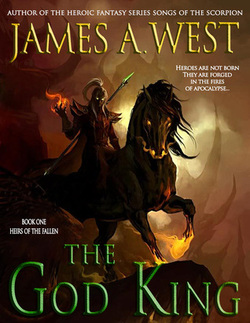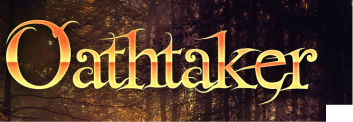
* * * *
I was provided a copy of The God King as a free download on Amazon. In exchange, I offer the author this, my honest review.
At the outset, I will note a couple of things that under most circumstances might have made me set this book aside—both are issues wholly personal to me and are not likely to speak to other readers. The first is that I am one of those readers of fantasy who does not appreciate the use of the apostrophe for the names of people or things. For example, how exactly do you pronounce Geh’shinnom’atar and Pa’amadin? It’s an odd prejudice of mine that has turned me away from more than one fantasy book or series that I’m sure would have been wonderful to read. Other than the form of such names with which I easily identify—O’Day or d’Artagnon, for example—I just find that reading such names causes me to stumble—over and over again. Thus, I avoid them. The second issue—also personal to me—is that I don’t like “dead people walking.” Whenever a story includes any sort of “zombie” type people—those who cease to live yet are somehow infused with the ability to continue on—I just get the creeps. Both issues were present in The God King and so, I might have put it down. . . .
However, notwithstanding the apostrophes and dead people, I kept on with The God King. The reason that I did so was simple: I just found the story so well written. Largely the tale of Kian, Hazad and Azuri, three Izutarians who reminded me of 'The Three Musketeers,' West weaves his tale smoothly and colorfully, if rather violently. So, here were the things I especially liked:
I enjoyed West’s voice. For example, Kian thinks: “We tasted war with our mothers’ milk, and as boys supped on the meat of suffering and want. As I recall neither flavor was sweet.”
I liked West’s word pictures: “He greedily sought that sweet bouquet, and she offered it up as a flower weeps nectar.”
I appreciated West’s choice of words that gave flavor to the alternative world that he created: crofters, midges, maw, barbican, denizens and rabble, by way of example.
I found West’s characters honorable at times, quirky at times, evil at times, and real. Hazad may have been “ugly as ten sins,” but he was always ready with a humorous quip. The fastidious Azuri may always have sought to look his best, but when he ceased to do so, it was a sign to all of what had been the cost of their traveling. As to the lead female character, Ellonlef, she was a Sister of Najihar, well educated and trained in the art of defense. I liked her because, though a beautiful woman, she was “made all the more so because she seemed not to know it.” She held firm in the face of danger, demanded to participate in efforts to overcome evil, and encouraged others to be the best they could be. As to Hya—I’d like to know more. It would be interesting to see her take on an even greater role. Regarding the despicable Prince Varis, he was just that—despicable—and the oily Uzzret was—well, we’ve all met someone like Uzzret!
Finally, I appreciated West’s creation of different types of people, from the denizens of the Chalice, to the Madi’in with their swatarin-induced visions of apocalypse, to the Bashye and their murderous ways.
It was because of West’s voice, intriguing word pictures, clever vocabulary, character development and world building that I was able to look beyond my prejudices about apostrophes and “dead people walking.” I am glad that I did because, in the end, I discovered a story that I quite enjoyed.
Find out more about The God King on Goodreads here. Find, follow and fan James A. West on Goodreads here. Check out West's blog here and follow him on Twitter (jwestbooks). The God King is available from Amazon here and from Barnes and Noble here.
I was provided a copy of The God King as a free download on Amazon. In exchange, I offer the author this, my honest review.
At the outset, I will note a couple of things that under most circumstances might have made me set this book aside—both are issues wholly personal to me and are not likely to speak to other readers. The first is that I am one of those readers of fantasy who does not appreciate the use of the apostrophe for the names of people or things. For example, how exactly do you pronounce Geh’shinnom’atar and Pa’amadin? It’s an odd prejudice of mine that has turned me away from more than one fantasy book or series that I’m sure would have been wonderful to read. Other than the form of such names with which I easily identify—O’Day or d’Artagnon, for example—I just find that reading such names causes me to stumble—over and over again. Thus, I avoid them. The second issue—also personal to me—is that I don’t like “dead people walking.” Whenever a story includes any sort of “zombie” type people—those who cease to live yet are somehow infused with the ability to continue on—I just get the creeps. Both issues were present in The God King and so, I might have put it down. . . .
However, notwithstanding the apostrophes and dead people, I kept on with The God King. The reason that I did so was simple: I just found the story so well written. Largely the tale of Kian, Hazad and Azuri, three Izutarians who reminded me of 'The Three Musketeers,' West weaves his tale smoothly and colorfully, if rather violently. So, here were the things I especially liked:
I enjoyed West’s voice. For example, Kian thinks: “We tasted war with our mothers’ milk, and as boys supped on the meat of suffering and want. As I recall neither flavor was sweet.”
I liked West’s word pictures: “He greedily sought that sweet bouquet, and she offered it up as a flower weeps nectar.”
I appreciated West’s choice of words that gave flavor to the alternative world that he created: crofters, midges, maw, barbican, denizens and rabble, by way of example.
I found West’s characters honorable at times, quirky at times, evil at times, and real. Hazad may have been “ugly as ten sins,” but he was always ready with a humorous quip. The fastidious Azuri may always have sought to look his best, but when he ceased to do so, it was a sign to all of what had been the cost of their traveling. As to the lead female character, Ellonlef, she was a Sister of Najihar, well educated and trained in the art of defense. I liked her because, though a beautiful woman, she was “made all the more so because she seemed not to know it.” She held firm in the face of danger, demanded to participate in efforts to overcome evil, and encouraged others to be the best they could be. As to Hya—I’d like to know more. It would be interesting to see her take on an even greater role. Regarding the despicable Prince Varis, he was just that—despicable—and the oily Uzzret was—well, we’ve all met someone like Uzzret!
Finally, I appreciated West’s creation of different types of people, from the denizens of the Chalice, to the Madi’in with their swatarin-induced visions of apocalypse, to the Bashye and their murderous ways.
It was because of West’s voice, intriguing word pictures, clever vocabulary, character development and world building that I was able to look beyond my prejudices about apostrophes and “dead people walking.” I am glad that I did because, in the end, I discovered a story that I quite enjoyed.
Find out more about The God King on Goodreads here. Find, follow and fan James A. West on Goodreads here. Check out West's blog here and follow him on Twitter (jwestbooks). The God King is available from Amazon here and from Barnes and Noble here.


